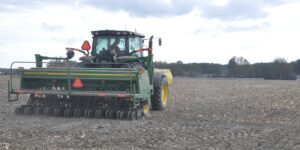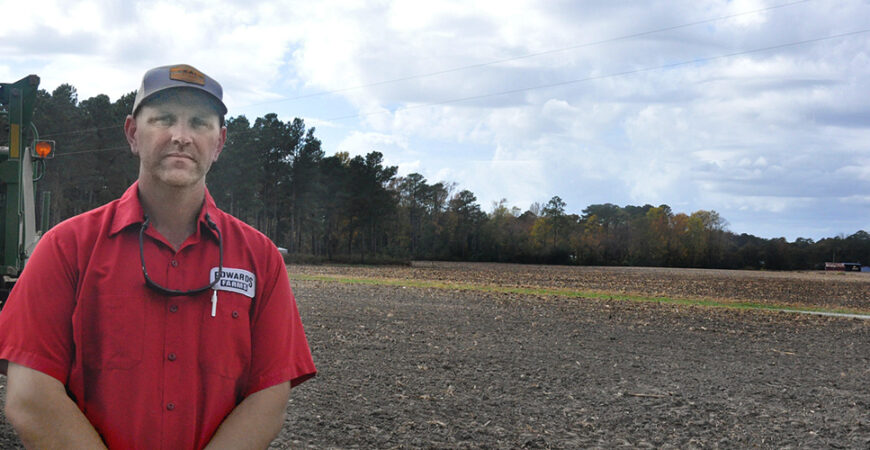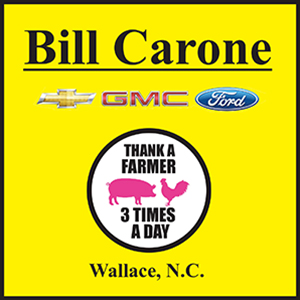“Duplin County is an agricultural powerhouse, in my opinion,” says Brent Davis, a farmer and chairman of the county school board. “I will say from a county perspective, from an agricultural standpoint, we can’t afford for that to ever change.”
Keeping Duplin County’s agricultural economy alive goes hand in hand with preserving its rich farmland. According to the North Carolina Department of Agriculture’s 2017 census, the most recent data available, Duplin County’s 243,098 acres of farmland makes up nearly half of the county’s total acreage. Year after year, the county tops the state in agricultural receipts, and that’s why it’s integral to maintain land on which to farm.
“Agriculture is obviously the bread and butter of Duplin County,” Davis adds.
That’s a sentiment shared by another local leader and farmer, County Commissioner Justin Edwards. “It’s super important to preserve our farmland,” Edwards says. “It’s not only the bread and butter of Duplin County; it’s the bread and butter of modern society. In fact, modern society survives because of farmers.”
Duplin’s appreciation of agriculture and preserving the farming way of life goes all the way to state government with N.C. Rep. Jimmy Dixon, who also happens to be a farmer. “Food and fiber are necessities,” he says. “A nation that can’t feed itself is a nation in jeopardy.”
Dixon chairs an appropriations committee that funds Agriculture Commissioner Steve Troxler’s Agricultural Development and Farmland Preservation Trust Fund so Duplin farmers can rest assured that they have a voice in state government. Recently, Troxler announced that applications for farmland preservation grants are open until 5 p.m. on Dec. 18.
“Investments in farmland preservation are more important than ever,” Troxler said in a press release. “In the face of population growth and development pressure, these grants are critical in preserving North Carolina’s agricultural economy and ensuring food security for future generations.”

According to Dixon, the biggest threats to farmland are development and solar farms. “Our research has helped us to be able to produce more on less acreage,” he says. “It appears we’re going to be able to continue to improve that. We’ve got to continue to produce more with the same land. It’s a great challenge.”
Dixon adds that the greatest help to accomplishing the goal of preserving farmland would be to teach those in more urban areas the importance agriculture has in their daily lives. “We’ve got to teach our urban friends that food doesn’t come from a grocery store. We’ve got to reintroduce Mr. and Mrs. Urbanite to our farming heritage. Our own success — meaning the success of farmers — means that we have given Mr. and Mrs. Urbanite the confidence that tomorrow’s dinner is on the grocery store shelves today.”
Davis is also doing his part to help ensure that future generations understand the importance of farming as well. “One thing within our school system is that we’ve adopted the STEAMA program, which focuses on STEM, as well as agriculture and the arts,” he says. “We want students in this county to know where their food comes from. And not only to understand where food comes from, but also understand how much of that food Duplin County provides.”
The preservation grants from Commissioner Troxler are great for the few that can get them, Davis says, but the real key is to educate the public so the general population will know that their lives literally depend on the fruits of farmers’ labor.
“Urban sprawl is real,” Edwards pointed out. In fact, the Cedar Fork community outside Beulaville in which he lives and farms hasn’t yet been affected by the rapid growth of nearby Camp Lejeune, but he knows that’s a possibility in the future. “With great economic growth, we can lose farmland. Over time, it may affect our farm, but I will do everything in my power as a commissioner, the president of the Duplin County Farm Bureau and a farmer to protect our way of life.”
He adds that it’s not his goal to keep development out of Duplin County, but to make people aware that development encroaching on a farming community can have detrimental effects not only on the farmer and his or her family, but society as a whole.
“Just about everything you come into contact with on a daily basis is touched by agriculture,” Edwards says. “A farmer is responsible for the towel you dry yourself off with after your shower, a farmer is responsible for the jacket you put on before you go out, a farmer is responsible for the sandwich you eat. Without a viable agricultural industry, society doesn’t flourish.”
As for the farmland preservation grants, landowners interested in preserving their farms through conservation easements must work with county governments or land trusts to apply for grant funds. Grant applications as well as rules and information packets are available online at www.ncadfp.org/Cycle17.htm.
 Twitter
Twitter Facebook
Facebook Instagram
Instagram





